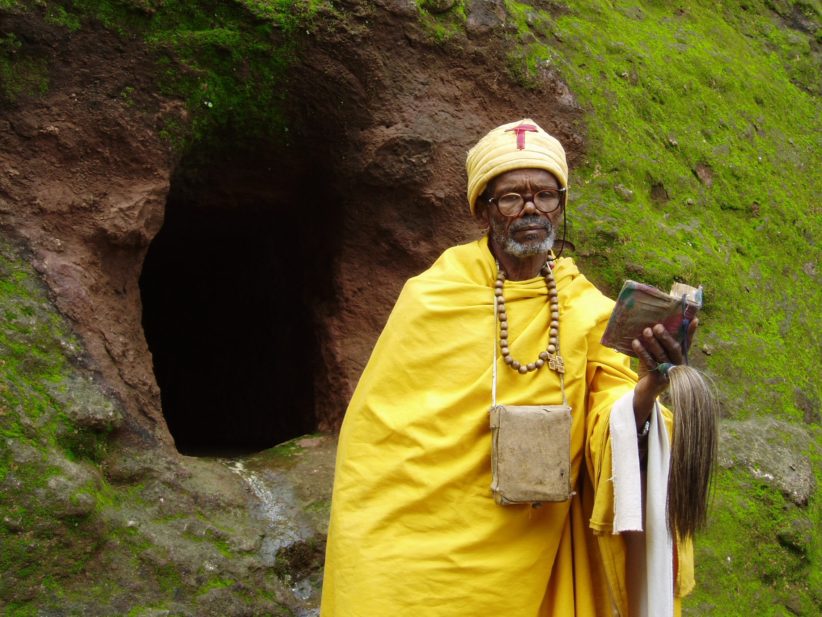As part of a fellowship in International Emergency Medicine, I spent six months (multiple trips over a two year period) in northern Ethiopia. One of the most otherworldly experiences I had during that time was exploring Lalibela, a town which occupies a revered place in Ethiopian Orthodox Christianity. A walk through town revealed temples hewn from single enormous slabs of rock and pilgrims gathered by the dozens in white robes atop cliffside churches. Religion pervades rural areas (where 80% of Ethiopians live), and many subsistence farming families send male children to live and study in monasteries. Extremes of poverty and piety are everywhere. Closet-sized caves containing barely more than simple cots surround the perimeter of many of the churches, in whose entrances religious zealots dressed in saffron robes finger amber rosary beads and read verses from bibles made of parchment as they beg for alms from pilgrims. These men are known as hermits, and they spend lives of devotion to the faith in these caves.
Ethiopian hermits come to mind because the FIRE universe is a bit of a cult, and we even have our own modern-day hermits.
Mike from Lacking Ambition spent a year living in a tent in the desert of New Mexico. Jacob from Early Retirement Extreme has built a cogent belief system, practices radical self-reliance and frugal, minimalist living, and prophesies coming days of reckoning (peak oil rather than judgement day) while offering a path of redemption he models for believers. Jacob in particular is a gifted and intellectually rigorous individual, and his outsize impact on both the FIRE community and the bloggers who influence it most profoundly (Mr. Money Mustache among others) is worth recognizing and celebrating.At the same time, it’s important to acknowledge that if the FIRE community resides two standard deviations from the mean in terms of financial savvy and frugality, Mike and Jacob represent points two standard deviations beyond the FIRE community. They represent the proverbial long tail, offering a niche message that represents an extreme within the niche community they target. Biblical prophets are remembered for speaking uncomfortable truths to the complacent masses, but reread their messages these many years later and (despite their resonance in our consumer culture) their proscriptions still sound harsh.
How much stuff is too much? The mainstream media has selectively jumped into the debate over consumption. There are appeals from high income Silicon Valley types to reduce one’s carbon footprint through minimalist, responsible luxury. There are critiques that denounce the “gospel of minimalism,” as simply the latest trend, a new status symbol that offers capitalist absolution for those wealthy enough to renounce what they previously flaunted while most of the world’s inhabitants are minimalist by necessity rather than choice. There are declutterers responding to their parents’ hoarding, which was their response to the deprivations of the Great Depression.
The FIRE blogging community makes a convincing case against succumbing to the hedonic treadmill. Minimalism and frugality are highly compatible with FIRE because less stuff necessarily lowers recurring expenses, overhead and the need for space to store it. There is wisdom in limiting consumption on the road to financial independence, and minimalism offers a coherent approach to accomplish this end.
The key is not to allow cost-containment to morph into austerity and abstention. The Mad Fientist has written movingly of how the ambitious pursuit of financial independence slowly turned his happy life into one of social withdrawal, deprivation and depression. Fortunately he realized his trajectory in time to reorient his life to one that emphasized happiness in the now instead of current misery with a vague hope of future fulfillment.Many of us in the FIRE community are motivated bordering on obsessive. We login to our Personal Capital accounts daily, even though we know that we’re better served by remaining oblivious to the daily whims of the market. We buy our clothing used and cut our own hair. These eccentricities can either serve or undermine our goals.
Financial independence is a laudable means to a more autonomous life pursuing personal meaning. When mistaken for an end in and of itself, financial independence becomes a fickle and callous god. Just as there exists a hedonic treadmill, those of us pursuing financial independence risk falling victim to the ascetic treadmill.
When we work hard to reduce costs, we risk overlooking value in the process. Thankfully, learning that even a guy on a $7,000 a year budget is willing to buy a new $300 jacket can teach us that recongizing value is as important a skill as cost-cutting on the road to financial independence. Let’s spend on those items that support our most important goals, and respectfully leave the caves for the true hermits.

